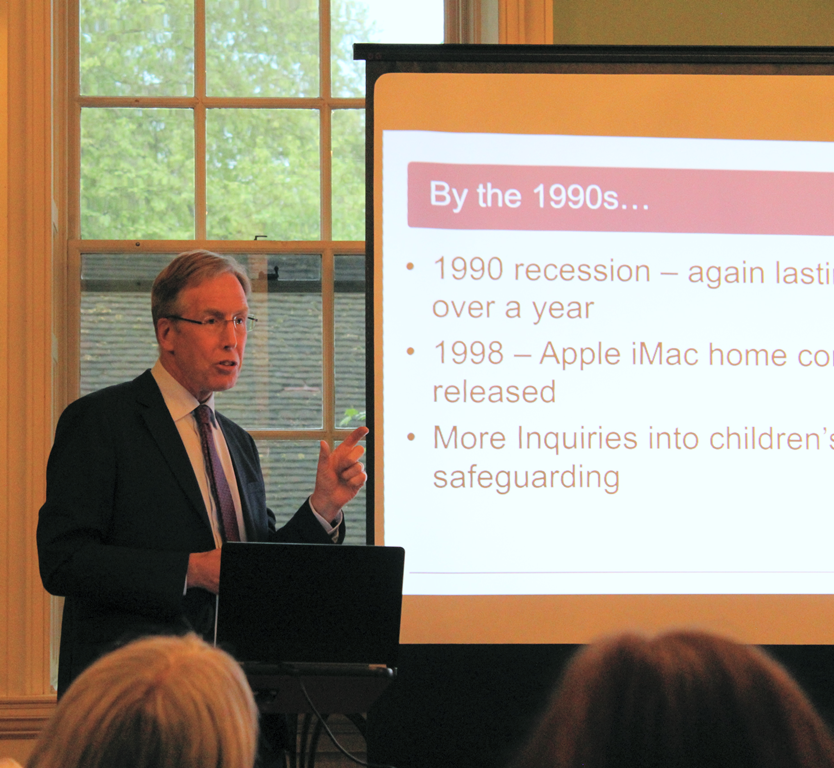The opening presentation by Dr Max Davie, Royal College of Paediatrics and Child Health, compared child obesity and conduct disorder. He held them both up as common conditions that have a lot of associated stigma, a dominant narrative that tends to blame the sufferers, where service provision is inadequate, and that is much more likely to be experienced by children in poor families. These are conditions where there is no single cause and no simple cure.
I was attracted to the idea that we need to get away from a narrow focus on treatment and look at these as “disorders of disempowerment” that require a new approach with empowerment at its heart. This would mean professionals working together to develop understanding, respect, and offer choices based in peoples’ pride in their locality. It would also require policy makers to face up to the health consequences of inequality and act accordingly. One idea was for areas to develop a cross agency ‘local offer’ for child and adolescent mental health that can be compared and inspected, in a similar way to what has been done for SEND services. Certainly there needs to be some way to get services to join up more effectively.
Sir David Behan, Chief Executive of the Care Quality Commission (CQC) contrasted the situation when he started his career in 1978 to the situation today and drew out some lessons. In some ways little has changed – in that the same issues of poor inter-agency communication continue to be raised in Serious Case Reviews. The difference being that there is more attempt to hold local service leaders responsible, when perhaps they should be seen as accountable rather than responsible for what goes wrong on their watch.
Sir David reminded us that in the field of technology many aspects of life have changed completely, but the way we engage as patients with health and social care services is not that different from how it was done in the 1970s. This is not good enough and we need to look at a new relationship between providers and recipients of services via technology.

Sir David Behan, Chief Executive of the Care Quality Commission (CQC)
It was also noted that in the intervening years confidence in politicians has plummeted. We need to understand what this means for the sort of transformational leadership we can reasonably expect from elected representatives and what we can do to secure the leadership that we need.
He suggested that the modern service landscape is characterised by volatility, uncertainty, complexity and ambiguity (VUCA. To me this may explain the repeated exhortations for services to be ‘agile’ to be able to cope with such an environment. To respond to this challenge Sir David counselled use to remember that we are not voiceless, choiceless, or powerless.
I share Sir David’s suggestion that as leaders and managers we should understand: why we have chosen the sector we are in, what motivates us; align our values and behaviour to this; engage with others in a way that involves actually listening, not just observing; and develop new services based first on trust, shared values, and shared data.
Prof Dame Sue Bailey OBE DBE, Chair of the Children and Young People’s Mental Health Coalition
Prof Dame Sue Bailey OBE DBE, Chair of the Children and Young People’s Mental Health Coalition, reminded us that young people need to emerge from adolescence into adulthood with the 4Cs: a sense of Control, the ability to Communicate, the skills to Co-operate and a willingness to Compromise. This can be a challenge and she commended a social identity approach to healthcare that seeks to equip young people with these elements. The aim would be to create a healthy and health-creating society where the children of today can transition through adolescence with the wellbeing needed for their future roles and lives.
The CEO of Coram, Dr Carol Homden CBE finished by reminding us that Coram is the country’s oldest children’s charity and that its founder Thomas Coram would have been 350 this year. Thomas Coram sought to act and engaged in a 17 year campaign to establish the charity through a special act of parliament and it continues today to work with some of the most vulnerable in society.
I was engaged by all of the speakers, but I was most moved by a young person who spoke of her experience of going from placement to placement with no access to mental health support and no one to tell her that this repeated disruption was not her fault.
She concluded “I have experienced separation and loss, but I also have hope; for myself and for others.”
Coram’s Director of Operations and Deputy CEO Renuka Jeyarajah-Dent has also written a blog on the event and the issues it raised for LocalGov, which you can read here.
